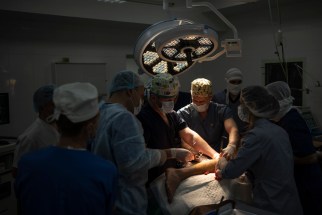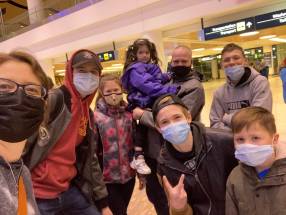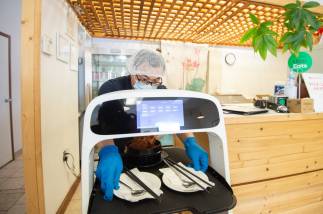Surgical task force can’t repair Tories’ damage to health care
Read this article for free:
or
Already have an account? Log in here »
To continue reading, please subscribe:
Monthly Digital Subscription
$0 for the first 4 weeks*
- Enjoy unlimited reading on winnipegfreepress.com
- Read the E-Edition, our digital replica newspaper
- Access News Break, our award-winning app
- Play interactive puzzles
*No charge for 4 weeks then price increases to the regular rate of $19.00 plus GST every four weeks. Offer available to new and qualified returning subscribers only. Cancel any time.
Monthly Digital Subscription
$4.75/week*
- Enjoy unlimited reading on winnipegfreepress.com
- Read the E-Edition, our digital replica newspaper
- Access News Break, our award-winning app
- Play interactive puzzles
*Billed as $19 plus GST every four weeks. Cancel any time.
To continue reading, please subscribe:
Add Free Press access to your Brandon Sun subscription for only an additional
$1 for the first 4 weeks*
*Your next subscription payment will increase by $1.00 and you will be charged $16.99 plus GST for four weeks. After four weeks, your payment will increase to $23.99 plus GST every four weeks.
Read unlimited articles for free today:
or
Already have an account? Log in here »
Hey there, time traveller!
This article was published 30/03/2022 (1351 days ago), so information in it may no longer be current.
It has become patently obvious that Manitoba’s vaunted surgical and diagnostic recovery task force has no quick fixes.
The task force, struck in December, was asked to find ways of alleviating Manitoba’s backlog of surgical and diagnostic procedures as quickly as possible. A backlog that Doctors Manitoba has estimated at nearly 170,000 procedures and growing.
On Tuesday, during the task force’s first full update in nearly two months, it became patently evident that immediate options for alleviating the backlog are few and far between.
There are ideas and initiatives coming forward. For example, there is a plan to build a new operating room at Concordia Hospital to perform 1,000 additional hip and knee surgeries, a promise of additional money for the Spine Assessment Clinic to more quickly determine surgical candidates, and new MRI and CT scanners to reduce diagnostic backlogs.
Unfortunately, it is unclear when — or even if — these measures will start to apply downward pressure on the backlogs.
For example, to build the new OR, the Concordia Foundation will have to raise about half of the $700,000 cost of renovating an existing structure, with the province paying the other half. Faced with a less urgent need for surgeries, this might be an acceptable way of proceeding. Facing a crisis, it seems penny wise and pound foolish.
To build the new OR, the Concordia Foundation will have to raise about half of the $700,000 cost of renovating an existing structure, with the province paying the other half.
The province has been able to send nine Manitobans to a private, not-for-profit hospital in North Dakota for spinal surgeries, with more surgeries planned. And there are plans to contract out other elective surgeries to the private sector. However, many of the other ideas floated Wednesday came across as half-baked.
The pledge to increase the number of surgeries performed during the summer months — a time when traditionally fewer procedures are done to accommodate vacation time for those working in health care — seems tenuous at best. The Manitoba Nurses Union confirmed nurses have been told some summer vacations will be cancelled unless volunteers step forward to cover off the new surgical slates.
There is no doubt the backlog is an all-hands-on-deck kind of problem. However, over the past two years, no single group within the health-care system has carried as much of the pandemic burden as nurses. Forcing nurses to give up summer vacations may be a necessary evil given the size of the backlogs. But it’s also a strategy that threatens to drive more nurses out of a system that is already struggling with a nursing shortage.
Meanwhile, the task force has been silent on a range of other ideas that seem to be low-hanging fruit in the battle to contain the backlogs.
Doctors Manitoba has been proposing for many months now a program to move certain diagnostic procedures, including some endoscopies, from hospitals to doctors’ offices. There was nothing on this at Tuesday’s briefing, although there was a promise that more ideas on improving access to endoscopies was coming “soon.”
Doctors Manitoba has been proposing for many months now a program to move certain diagnostic procedures, including some endoscopies, from hospitals to doctors’ offices.
It’s also worth noting the task force stated its overarching goal was to reduce the backlog to pre-pandemic (2019) levels, although it did not specify when that benchmark would be met. Few Manitobans should take comfort from that pledge.
In 2019, the crippling austerity imposed by former premier Brian Pallister was just starting to reveal cracks in the health-care system. The wait times for hips, knees and cataracts skyrocketed in Manitoba to levels well above those in 2016, when the Progressive Conservatives won back the right to govern from the NDP.
The current government may think that going from worse to plain old bad is a step in the right direction. But it’s no comfort to Manitobans languishing on wait lists.
Taken together, the ideas raised this week confirm an inescapable truth about the task force and its work to date: this is a group of well-meaning health professionals who have been dealt a very bad hand.
Taken together, the ideas raised this week confirm an inescapable truth about the task force and its work to date: this is a group of well-meaning health professionals who have been dealt a very bad hand.
The task force can only work with the resources and commitment provided to it by the government of the day. And day after day, this is a government that has demonstrated it simply does not know how to fix all of the problems in health care it has created since coming to power in 2016.
The pandemic arrived in Manitoba to find the hospital network in Winnipeg, and relationships with nurses and other health-care professionals, in tatters. Years of cost control resulted in a reduction in service and a massive increase in wait times. The system was short-staffed, under-resourced and demoralized.
In fact, many of the initiatives being announced now by the task force — the construction of new operating rooms, purchase of additional MRIs and CTs, and a central information technology system intake to manage surgical wait lists — are things the health-care system has needed for years but was denied by a government focused single-mindedly on balancing the budget while simultaneously cutting taxes.
Yes, the pandemic has largely driven the backlogs to astronomical heights. But it has been the inability of this government to manage health care that laid the groundwork.
And when all is said and done, it may be unfair to ask one task force to repair all that damage.
dan.lett@winnipegfreepress.com

Born and raised in and around Toronto, Dan Lett came to Winnipeg in 1986, less than a year out of journalism school with a lifelong dream to be a newspaper reporter.
Our newsroom depends on a growing audience of readers to power our journalism. If you are not a paid reader, please consider becoming a subscriber.
Our newsroom depends on its audience of readers to power our journalism. Thank you for your support.








